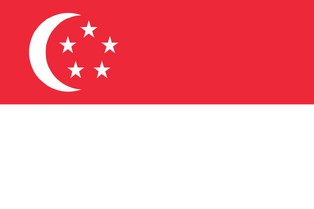Singapore

Flag of Singapore
(i/ˈsɪŋəpɔr/ or /ˈsɪŋɡəpɔr/), officially the Republic of Singapore, is a modern city-state and island country in Southeast Asia. It lies off the southern tip of the Malay Peninsula and is 137 kilometres (85 mi) north of the equator; it is also separated from Peninsular Malaysia by the Straits of Johor to the north, and from Indonesia's Riau Islands by the Singapore Strait to the south. Singapore's territory consists of the diamond-shaped main island, commonly referred to as Singapore Islandin English and Pulau Ujong in Malay, and more than 60 significantly smaller islets; also, land reclamation has been used to expand Singapore's land area, which is highly urbanised.
The islands were settled in the second century AD and subsequently belonged to a series of local empires. Modern Singapore was founded in 1819 by Sir Thomas Stamford Raffles as a trading post of the East India Company with permission from theJohor Sultanate. The British obtained sovereignty of the islands in 1824, and Singapore became one of the British Straits Settlements in 1826. Occupied by the Japanese during World War II, Singapore became independent from the United Kingdom in 1963 and united with other former British territories to form Malaysia, from which it was expelled two years later through a unanimous act of parliament. After experiencing some turbulence in its early years as a nation, Singapore embarked on a path of development, earning recognition as one of the Four Asian Tigers.
Singapore is one of the world's major commercial hubs, the fourth-largest financial centre and one of the top two busiest container ports in the world for at least the past ten years. Its globalised and diversified economy depends heavily on trade, especially manufacturing, which accounted for around 30 percent of Singapore's GDP in 2013. Singapore places highly in international rankings with regard to standard of living, education, healthcare, and economic competitiveness. Singapore hasone of the highest per capita incomes and one of the longest overall life expectancies in the world. The country is currently the only Asian country with a top AAA rating from all three major credit rating agencies, i.e. Standard & Poor's, Moody's and Fitch Ratings.
About 5.5 million people live in Singapore (as of end-June 2014), 3.4 million of whom are citizens and the remaining 2.1 million are foreign nationals (consisting of 0.5 million permanent residents and 1.6 million non-permanent residents). According to the country's most recent census (in 2010), nearly 23% of Singaporean residents (i.e. citizens and permanent residents) wereforeign born (which means about 10% of Singapore citizens were foreign-born naturalised citizens); if non-residents were counted, nearly 43% of the total population were foreign born. As an immigrant country with numerous links to the global economy, Singapore is one of the most globalised countries in the world.
Singapore is ethnically diverse. Ethnic Chinese Singaporeans predominate with about 74.1% of the resident population, followed by significant minorities of Malays (13.4%), Indians (9.2%), and Eurasians. There are four official languages: English, Malay, Mandarin, and Tamil. English is the common language of the country. Singapore promotes multiculturalism through a range of policies.
Singapore is a unitary multiparty parliamentary republic, with a Westminster system of unicameral parliamentary government. The People's Action Party has won every election since self-government in 1959. Singapore is classified as a flawed democracy in the Economist Intelligence Unit's Democracy Index. One of the five founding members of the Association of Southeast Asian Nations (ASEAN), Singapore is also the host of the Asia-Pacific Economic Cooperation (APEC) Secretariat, and a member of the East Asia Summit, the Non-Aligned Movement, and the Commonwealth of Nations. Singapore has significant influence on global affairs relative to its size, leading some analysts to classify it as a middle power.
All sources from Wikipedia
